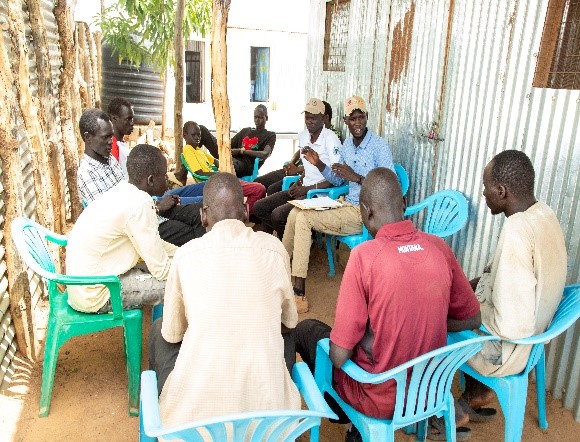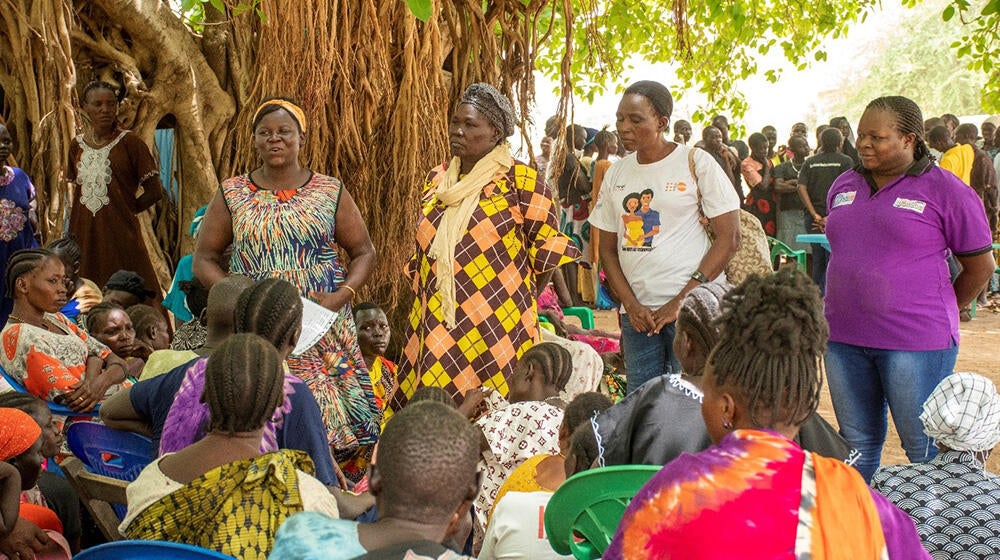In the remote and underserved communities of Mangalla, Central Equatorial State there exists a camp of internally displaced persons (IDP) and host community numbering about forty thousand (40,000) people with limited access to health services.
Access to Sexual and Reproductive Health services has long been a challenge in a country like South Sudan which mostly relies on the services of non-governmental organisations (NGOs) to provide health care services. In a bid to bridge this health gap, Amref Health Africa in partnership with the State Ministry of Health coordinated a health camp to reach mothers and girls in Mangalla.
This coordination and actualization did not come easy as it involved quite a heavy logistical burden to move the supplies from Juba to Mangalla. With thanks to the public-private partnerships, Amref Health Africa identified Buckey Clinic operating on the ground made it easy for both Amref and the State Ministry to Health to quickly ascertain the SRHR needs of displaced people and the host community.
Amref recognized the urgent needs and vulnerabilities this marginalized population in the IDP and the host community and realized the dire need for family planning services at Mangalla, Primary Health Care Centre and Buckey clinic. In addition, there is no existence of the Adolescents and Youth friendly space and only two midwives are serving the entire population in the community.
In response to this need, Amref with support from UNFPA embarked on a 2- day-targeted high-level Integrated SRHR outreach initiative aimed at reaching marginalized populations and ensuring that no one was left behind with the mindset of bridging gaps, empowering individuals, and promoting inclusivity.
Under that, an outreach team, comprising two (2) midwives, (2) nurses, a lab technician, a clinical officer, and social mobilizers, were supervised by Amref, CHD, Juba Teaching Hospital, and the Ministry of Health set sail to Mangalla as echoed by Keji, a new mother who benefited from the camp.
“We now feel cared for. I hope they continue organizing these sessions in other places too, especially for young mothers like me. There are so many misconceptions about family planning in our community, and everyone needs to know the truth." – Keji, a young mother.
Central to the success was the integration of culturally sensitive approaches that respected the beliefs, customs, and values of the communities. We engaged community leaders, opinion leaders, administrators, and traditional healers to gain their trust and ensure that our interventions were culturally appropriate and acceptable.
“Today has been such a blessing for me, being a young mother. I have often felt overwhelmed and unsure of how to navigate everything. But after hearing about family planning, I see things in a whole new light. It's not just about preventing pregnancies; it's about giving us, young mothers, the tools to manage our choices better. Having these services available right here in our community means the world to us” said Nyoka through a translator.
An estimated total of 6, 519 people were reached with SRHR information mainly on safe motherhood, family planning, adolescents youth friendly services, sexual transmitted diseases, Men involvement in SRHR, and GBV prevention.
"You know, when I first walked into that group session, I didn't know what to expect. They spoke about staying in school, understanding our bodies and making smart informed decisions about my body. When they talked about sexual reproductive health, it was like a light bulb went off in my head. Learning how to stay safe, taking care of myself, and making choices... I felt empowered. I'm grateful for what I learned today, and I can't wait to share it with my friends." - Mary, 17 years old.

The impact of the outreach was profound, empowering individuals, strengthening communities, and advancing health equity. By reaching marginalized populations with tailored interventions, we not only improved health outcomes but also fostered resilience and self-determination as seen in the two testimonials during the outreach.
With support from UNFPA, Amref is committed to leaving no one behind in the journey towards universal access to SRHR services. By continuing to prioritize marginalized populations, adapt to evolving needs, and advocate for inclusive policies, we can build a future where everyone can realize their sexual and reproductive health rights.
In the remote and underserved communities of Mangalla, Central Equatorial State there exists a camp of internally displaced persons (IDP) and host community numbering about forty thousand (40,000) people with limited access to health services.
Access to Sexual and Reproductive Health services has long been a challenge in a country like South Sudan which mostly relies on the services of non-governmental organisations (NGOs) to provide health care services. In a bid to bridge this health gap, Amref Health Africa in partnership with the State Ministry of Health coordinated a health camp to reach mothers and girls in Mangalla.
This coordination and actualization did not come easy as it involved quite a heavy logistical burden to move the supplies from Juba to Mangalla. With thanks to the public-private partnerships, Amref Health Africa identified Buckey Clinic operating on the ground made it easy for both Amref and the State Ministry to Health to quickly ascertain the SRHR needs of displaced people and the host community.
Amref recognized the urgent needs and vulnerabilities this marginalized population in the IDP and the host community and realized the dire need for family planning services at Mangalla, Primary Health Care Centre and Buckey clinic. In addition, there is no existence of the Adolescents and Youth friendly space and only two midwives are serving the entire population in the community.
In response to this need, Amref with support from UNFPA embarked on a 2- day-targeted high-level Integrated SRHR outreach initiative aimed at reaching marginalized populations and ensuring that no one was left behind with the mindset of bridging gaps, empowering individuals, and promoting inclusivity.
Under that, an outreach team, comprising two (2) midwives, (2) nurses, a lab technician, a clinical officer, and social mobilizers, were supervised by Amref, CHD, Juba Teaching Hospital, and the Ministry of Health set sail to Mangalla as echoed by Keji, a new mother who benefited from the camp.
“We now feel cared for. I hope they continue organizing these sessions in other places too, especially for young mothers like me. There are so many misconceptions about family planning in our community, and everyone needs to know the truth." – Keji, a young mother.
Central to the success was the integration of culturally sensitive approaches that respected the beliefs, customs, and values of the communities. We engaged community leaders, opinion leaders, administrators, and traditional healers to gain their trust and ensure that our interventions were culturally appropriate and acceptable.
“Today has been such a blessing for me, being a young mother. I have often felt overwhelmed and unsure of how to navigate everything. But after hearing about family planning, I see things in a whole new light. It's not just about preventing pregnancies; it's about giving us, young mothers, the tools to manage our choices better. Having these services available right here in our community means the world to us” said Nyoka through a translator.
An estimated total of 6, 519 people were reached with SRHR information mainly on safe motherhood, family planning, adolescents youth friendly services, sexual transmitted diseases, Men involvement in SRHR, and GBV prevention.
"You know, when I first walked into that group session, I didn't know what to expect. They spoke about staying in school, understanding our bodies and making smart informed decisions about my body. When they talked about sexual reproductive health, it was like a light bulb went off in my head. Learning how to stay safe, taking care of myself, and making choices... I felt empowered. I'm grateful for what I learned today, and I can't wait to share it with my friends." - Mary, 17 years old.
The impact of the outreach was profound, empowering individuals, strengthening communities, and advancing health equity. By reaching marginalized populations with tailored interventions, we not only improved health outcomes but also fostered resilience and self-determination as seen in the two testimonials during the outreach.
With support from UNFPA, Amref is committed to leaving no one behind in the journey towards universal access to SRHR services. By continuing to prioritize marginalized populations, adapt to evolving needs, and advocate for inclusive policies, we can build a future where everyone can realize their sexual and reproductive health rights.


